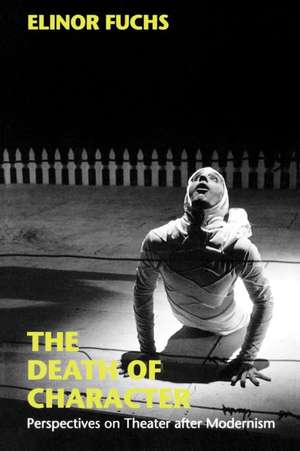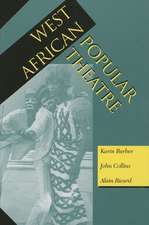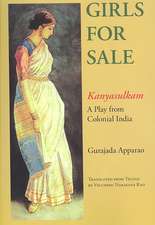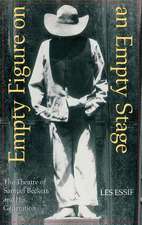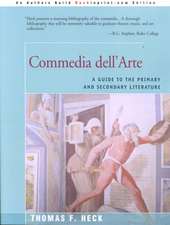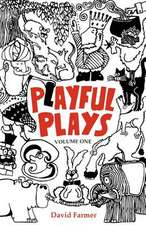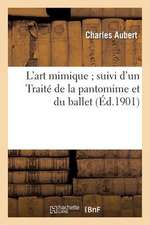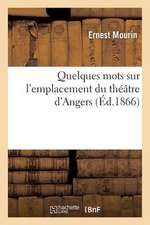The Death of Character – Perspectives on Theater after Modernism: Drama & Performance
Autor Elinor Fuchsen Limba Engleză Paperback – 21 iul 1996
Preț: 156.00 lei
Nou
Puncte Express: 234
Preț estimativ în valută:
29.85€ • 31.05$ • 24.65£
29.85€ • 31.05$ • 24.65£
Carte tipărită la comandă
Livrare economică 15-29 aprilie
Preluare comenzi: 021 569.72.76
Specificații
ISBN-13: 9780253210081
ISBN-10: 0253210089
Pagini: 240
Dimensiuni: 154 x 232 x 17 mm
Greutate: 0.38 kg
Editura: MH – Indiana University Press
Seria Drama & Performance
ISBN-10: 0253210089
Pagini: 240
Dimensiuni: 154 x 232 x 17 mm
Greutate: 0.38 kg
Editura: MH – Indiana University Press
Seria Drama & Performance
Recenzii
Treating theater as a crucial mediating term between the heterogeneous fullness of life and the clarifying abstractions of theory and as a grounding principle in a period of conflicting or dissolving truths, Fuchs (Yale and Columbia) demonstrates in this sage and sane examination of postmodern theater (especially in the US) why she is one of the most astute observers of the contemporary scene. As a critic she brings to this perceptive, dense study not only insights of sheer brilliance but historical perspective (including samplings of her own reviews and articles, 1979-93) and contextual overview rare in contemporary critical writing. Although clearly supportive of trends challenging more traditional approaches in theater, she remains objective and balanced throughout. She provides illuminating analyses of work by such artists as Richard Foreman, Robert Wilson, Meredith Monk, Reza Abdoh, Elizabeth LeCompte, and Suzan-Lori Parks, among others, and such influential theorists as Jacques Derrida. Arguably the most accessible yet learned road map to what remains for many impenetrable territory, Fuchs' book, heavily theoretical but constantly anchored to specific performances, is an obligatory addition to all academic libraries serving upper-division undergraduates and abovD. B./P>--D. B. Wilmeth, Brown University"Choice" (01/01/1996)
Textul de pe ultima copertă
In this engrossing study, Elinor Fuchs explores the multiple worlds of theater after modernism. She begins with the decline of character, once the central link between the artist and the spectator. In theatrical modernism Fuchs sees a series of strategies to compensate for this decline. Postmodern theater no longer greets the demotion of character with anxiety, despair, or satisfaction--as in Pirandello, Beckett, or Brecht--but puts in its stead a multiple subject, a protean spectator, and a dispersed field of attention.
Cuprins
Introduction
Part I: Modern Retrospect
1. Character: Its Rise and Fall
2. The Mysterium and the Re-Allegorization of Modern Drama
3. Reading Against the Grain
Part II: Theater After Modernism
4. Signalling Through the Signs: Thinking Theater After Derrida
5. Play as Landscape: Another Version of Pastoral
6. Staging the Obscene Body
7. Theater as Shopping
8. Postmodernism and the "Scene" of Theater
Reviews and Articles 1979-1993: Accounts of an Emerging Aesthetic
1979 Des McAnuff's Leave it to Beaver is Dead
Richard Schechner's The Balcony
1982 Andrei Serban's The Marriage of Figaro
1983 The Death of Character
1985 Peter Sellars's The Count of Monte Cristo
1986 Robert Wilson's Alcestis
1988 Elizabeth LeCompte and The Wooster Group's Frank Dell's The Temptation of Saint Antony
1989 Misunderstanding Postmodernism: Joanne Akalaitis's Cymbeline
1993 The AIDS Quilt and The Performance of Mourning
Part I: Modern Retrospect
1. Character: Its Rise and Fall
2. The Mysterium and the Re-Allegorization of Modern Drama
3. Reading Against the Grain
Part II: Theater After Modernism
4. Signalling Through the Signs: Thinking Theater After Derrida
5. Play as Landscape: Another Version of Pastoral
6. Staging the Obscene Body
7. Theater as Shopping
8. Postmodernism and the "Scene" of Theater
Reviews and Articles 1979-1993: Accounts of an Emerging Aesthetic
1979 Des McAnuff's Leave it to Beaver is Dead
Richard Schechner's The Balcony
1982 Andrei Serban's The Marriage of Figaro
1983 The Death of Character
1985 Peter Sellars's The Count of Monte Cristo
1986 Robert Wilson's Alcestis
1988 Elizabeth LeCompte and The Wooster Group's Frank Dell's The Temptation of Saint Antony
1989 Misunderstanding Postmodernism: Joanne Akalaitis's Cymbeline
1993 The AIDS Quilt and The Performance of Mourning
Notă biografică
Elinor Fuchs
